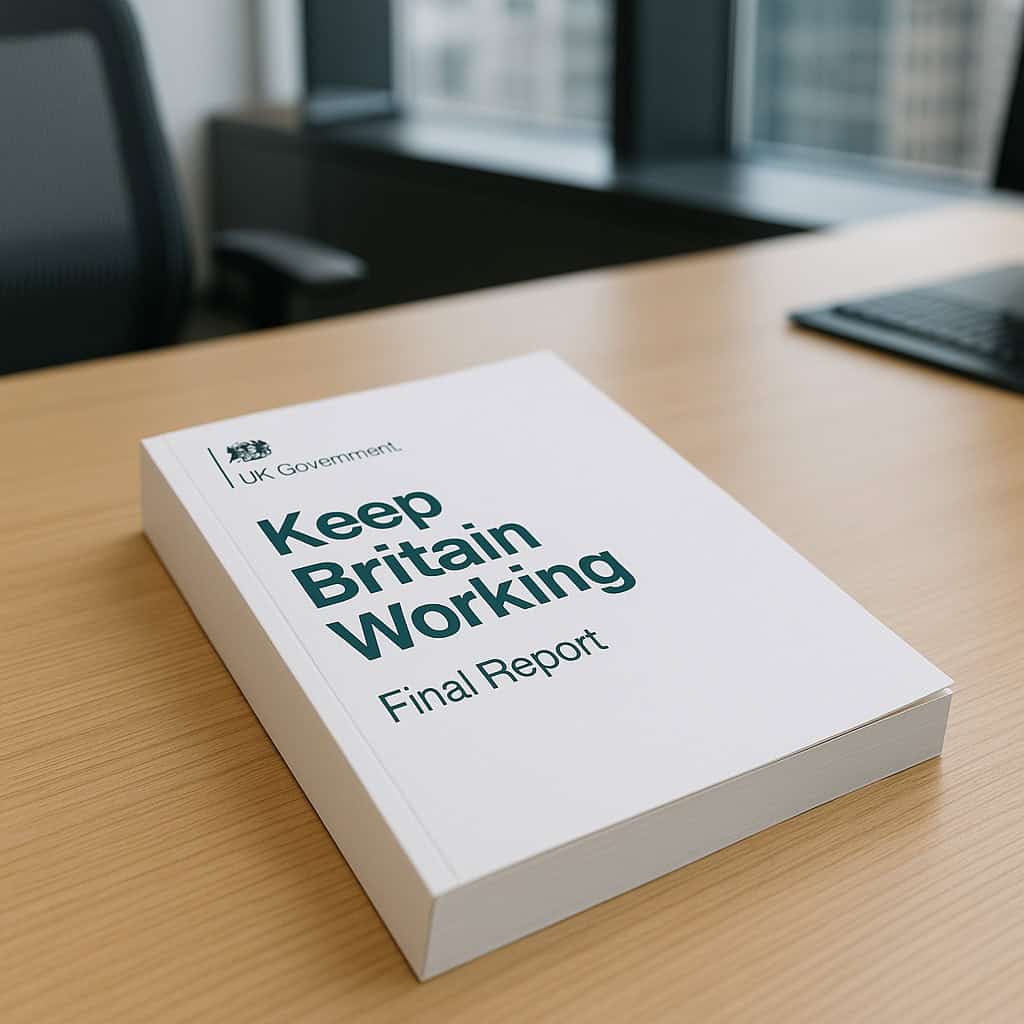Keep Britain Working review
The Keep Britain Working report sets out a stark warning: the UK is in the grip of an “economic inactivity crisis” driven heavily by ill-health and disability.
Over one in five working-age adults are now out of work and not looking at returning, a rate markedly higher than key comparators. Employers face costs of around £85 billion each year from sickness absence, presenteeism and staff turnover.
The key message from the report: change isn’t optional – both the state and the business community have to act. For HR professionals and business leaders this translates into several practical implications.
“Healthy Working Lifecycle”
First, the report proposes a “Healthy Working Lifecycle” framework, which would apply through recruitment & onboarding, to being healthy in work, being unwell in work, managing absence/return and onto exit/re-employment. The idea is to embed health, inclusion and prevention at each stage, rather than waiting until someone hits a crisis.
Second, the report proposes the creation of a new “Workplace Health Provision” (“WHP”) service – a non-clinical case management service that supports employees and line managers across the employment Healthy Working Lifecycle.
Funded by employers and building initially from existing resources, the WHP will offer support and advice, early intervention, good case management, and targeted early-stage treatment pathways.
Over time, the government may envisage the provision becoming certified, being integrated with the NHS app and reducing – or even replacing – the need for the current fit note.
Health data is key
Third, a data and intelligence arm is proposed, a “Workplace Health Intelligence Unit” will gather, analyse and publish evidence to support decision-making, incentivise employers with good practice and underpinning reforms of systems such as the “fit note” and welfare links.
The up-shot for HR: internal metrics, early-intervention conversations, stronger links with OH and more formalised systems could help avoid the big cost of unmanaged ill-health.
The limits of the review
However, there are a number of caveats and weaknesses that business and HR should bear in mind. First, the report is heavy on ambition, but light on immediate action. Many recommendations are phrased as “over the next 3-7 years” via a “vanguard phase”, not via immediate mandates.
That means for HR teams the clarion call is there, that change needs to happen, yet the regulatory or financial levers may not be in place for quite some time.
Second, while the report emphasises employer leadership it implicitly assumes many organisations have the capacity and maturity to lead on health outcomes. This is arguably optimistic, especially for SMEs which the review itself (and other leading sources) identifies as under-resourced (e.g., only 30% of SMEs currently offer OH provision).
Third, there is a risk of “one size fits all” in any certified standards. Whilst there may be similarities between some professional fields, the world of work is not homogenised. HR must ensure any frameworks adapt to the particularities of their workforce, or they risk becoming just box-ticking.
Fourth, it is clear that employers will be expected to pay, rather than the state providing support. Something like the Apprenticeship Levy may well come to pass, just focussed on health.
Finally, while the data ambition is welcome, at present much of the evidence base is acknowledged as weak or inconsistent. The business case is plausible, but it is centred on modelling, rather than existing evidence from any tested large-scale interventions.
Top 10 HR actions to prepare for “Keep Britain Working” agenda
1. Make health strategy a board-level issue
Treat workforce health and inclusion as core to business resilience, not a welfare add-on. Report headline metrics (absence, turnover, wellbeing) alongside financial KPIs.
2. Audit your current occupational health access
Know exactly what OH services you have, who can use them and how quickly. For SMEs, explore shared-service or accredited supplier models (like SEQOHS) in anticipation of the new Workplace Health Provision service.
3. Map your employee lifecycle for health touchpoints
Build in health conversations from onboarding to exit. Use “healthy working lifecycle” mapping to identify where issues are missed, especially at return-to-work or performance-review stages.
4. Strengthen early-intervention processes
Train managers to spot warning signs (stress, musculoskeletal problems, long-term conditions). Create fast-track routes to support before absence becomes long-term.
5. Refresh fit-note and return-to-work processes
The review suggested changes are likely. Review HR policies now so that “may be fit” recommendations lead to real adjustments and prompt reviews, not default sickness absence.
6. Invest in line-manager capability
Managers are the linchpin of any workplace-health initiative. Prioritise training in disability confidence, mental-health awareness and reasonable adjustments.
7. Start collecting meaningful health data
You may need a baseline for the upcoming Workplace Health Intelligence Unit data to be of much use. If you can, track absence length, causes, OH referrals and outcomes.
8. Review job design and flexibility
Many long-term conditions can be managed with redesigned tasks, hybrid working or tech aids. Embed flexibility into role templates now before it’s mandated.
9. Communicate the business case internally
Frame health initiatives as productivity and retention tools. Share short success stories showing the ROI of good support, as it encourages cultural buy-in.
10. Build partnerships now
Connect with local NHS employment advisers, disability charities, and accredited OH providers. Collaboration will be the fastest way to align with the new national framework.
About Occupational Health Assessment Ltd
Occupational Health Assessment Ltd is an SEQOHS Accredited and Certified B-Corp nationwide occupational health provider.
We provide rapid access to expert occupational health support for businesses right across the United Kingdom. Appointments are available nationwide within two days.
With a unique occupational health assessment service, night worker health assessments, fitness certifications and access to clinics in Belfast, Birmingham, Bradford, Brighton, Bristol, Cardiff, Coventry, Derby, Edinburgh, Glasgow, Hull, Leeds, Leicester, Liverpool, London, Manchester, Newcastle, Northampton, Nottingham, Plymouth, Portsmouth, Reading, Sheffield, Southampton, Stoke, Surrey and more, the business provides high quality, expert medical advice.
Please contact us for further information or assistance.
